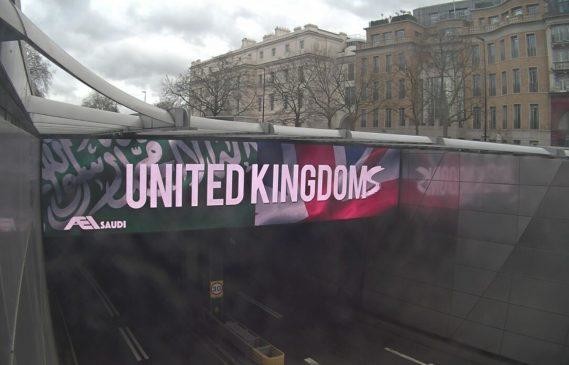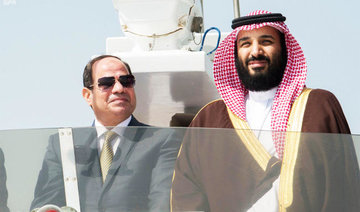LONDON: Saudi Arabia’s Crown Prince Mohammed bin Salman has left Cairo en route to the UK for an official three-day visit. In a statement, the Saudi Press Agency said the Saudi royal is expected to hold discussions with the Prince of Wales, Prime Minister Theresa May, and other officials on world issues and ways to improve bilateral relations.
Prior to his arrival, billboards highlighting Saudi Arabia’s Crown Prince Mohammed bin Salman first visit to London as heir to the throne, have appeared on the city’s streets, as reported by Saudi state-news channel Al-Ekhbariya.
The visit is expected to focus on defense, security and economic ties. The two sides will also review key bilateral and regional issues.
Saudi crown prince heads to UK for official visit
Saudi crown prince heads to UK for official visit

Adviser to UAE president warns of regional gridlock without strategic shifts

DUBAI: Anwar Gargash, diplomatic adviser to the UAE president, defended the country’s foreign policy and addressed the Arab world’s uncertain geopolitical landscape during a panel discussion at the Arab Media Summit in Dubai.
“How can you explain everything that is happening in the Arab world now?” asked Taher Baraka, presenter at Al Arabiya.
Gargash responded with a single word: “Uncertainty.”
Elaborating on this theme, he pointed to the fragile resurgence of nations such as Syria and Lebanon as central to the region’s current volatility.
“We have two Arab worlds,” he said. “There is the GCC, and then there are Arab countries that are suffering.”
Gargash emphasized the UAE’s proactive foreign policy, which he described as essential to fostering stability and peace for the Emirati people.
“We know we have to address the problems in our region,” he said. “Yes, there are challenges — but there is also significant potential.”
He also addressed criticism surrounding the UAE’s decision to normalize ties with Israel, a move that has sparked debate across the Arab world.
“Normalization is being used as a scare tactic,” he said. “But it is a sovereign decision, and for us, it was the right choice.”
Despite this stance, Gargash reaffirmed the UAE’s enduring support for the Palestinian cause.
“Our commitment to the Palestinian people and their right to a state remains unchanged. Their suffering brings us real pain,” he said.
Gargash argued that without normalization, the Arab world risks clinging to outdated strategies that perpetuate conflict and division.
Using the metaphor of a “bottleneck,” he described the political paralysis in Syria and Lebanon, where armed militias continue to undermine national sovereignty.
“We cannot have two armies in one country,” he said. “We need realistic priorities.”
Gargash highlighted the UAE’s role in supporting crisis-hit nations, pointing to the large Lebanese and Syrian diasporas in the Emirates.
“The UAE has been the breathing lungs for Lebanon and Syria during the height of their crises. Many of their citizens came here and thrived. If they can innovate here, they can innovate in Lebanon or Syria,” he said.
New school for neurodiverse children to open in Riyadh

- Enrollment is now open for the 2025 academic year
RIYADH: A new school specializing in educating neurodiverse children aged 3 to 9 will open in Riyadh in September, it was announced on Tuesday evening.
Josour Schools held a seminar in Riyadh this week to make the announcement, highlighting its unique model, which combines education, therapy and family services.
The school, which will be located in Roshn’s Sedra 1 community, is the result of a partnership between the Educational Infrastructure Holding Co. and UK-based CareTech.
“CareTech is always rooted in the communities in which we operate our services,” Shokat Akbar, CEO of CareTech International, told Arab News. “For (Josour) to succeed, it must be rooted in the community and be … in partnership with the community.”
Aligned with Saudi Arabia’s Vision 2030 goals, Josour Schools adopts a British curriculum adapted to local cultural values.
Its small-class model, led by neurodiversity specialists, focuses on individualized education plans and combines education with therapeutic interventions.
“This school serves a critical purpose: providing good quality access to special education needs services for children,” Akbar said. “Inclusivity comes in many ways.
“Students (will) participate in society through art and sport, making their contributions visible.”
The school will have access to resources from CareTech’s global network of 47 UK schools and 550 specialized services.
“Teachers will attend CareTech UK schools as part of their induction and training,” Akbar said, adding that Josour’s therapists would collaborate with experts across CareTech’s global network, including researchers and practitioners.
Enrollment is now open for the 2025 academic year.
Saudi Aramco prices three-part bond sale at $5bn

RIYADH: Saudi Aramco has priced its dollar-denominated 3-part bonds at $5 billion and set spread for them, fixed income news service IFR reported on Tuesday.
Aramco priced its five-year debt sale at $1.5 billion with spread set at 80 basis points over US Treasuries, tighter than 115 bps over the same benchmark released earlier in the day.
Meanwhile, the 10-year portion spread was set at 95 bps with a price of $1.25 billion and its 30-year portion spread was set at 155 bps with a price of $2.25 billion, IFR said. The spread was over the same benchmark tightened from 130 and 185 bps.
The proceeds from each issue of bonds will be used by Saudi Aramco for general corporate purposes, the company said in a bourse filing.
Before the pricing was announced, the debt deal was expected to be benchmark-sized, which is usually considered to be at least $500 million.
Earlier this month, Aramco reported a 4.6 percent drop in first-quarter profits, citing lower sales and higher operating costs as economic uncertainty hit crude markets.
Reuters reported last week that the oil giant is exploring potential asset sales to release funds as it pursues international expansion and weathers the impact of lower crude prices.
The company last turned to global debt markets in July when it raised $6 billion from a three-tranche bond sale.
Saudi Arabia, which is seeking funds to invest in new industries and wean its economy away from oil under its Vision 2030 plan, has long relied on Saudi Aramco to support economic growth.
Other Gulf issuers have tapped debt markets in recent months, braving a market turmoil caused by US President Donald Trump’s tariff policies.
They include Saudi Arabia’s $925 billion sovereign wealth fund and Abu Dhabi’s renewable energy firm Masdar, which last week raised $1 billion with a green bond. (Reporting by Hadeel Al Sayegh and Federico Maccioni in Dubai, Mohammad Edrees in Bangalore; Additional reporting by Pushkala Aripaka; Editing by Kirsten Donovan, Barbara Lewis, David Evans and Mark Porter)
Zelensky visits Berlin as he seeks more support for Ukraine in the war against Russia

- Germany has been the second-biggest supplier of military aid to Ukraine after the United States
- Friedrich Merz has plunged into diplomatic efforts to try to secure a ceasefire and keep Western support for Ukraine intact
BERLIN: Ukrainian President Volodymyr Zelensky met with new German Chancellor Friedrich Merz in Berlin on Wednesday as Ukraine seeks further military support amid a recent escalation in Russia’s bombing campaign, despite US-led efforts to end the war.
Germany has been the second-biggest supplier of military aid to Ukraine after the United States. Merz has plunged into diplomatic efforts to try to secure a ceasefire and keep Western support for Ukraine intact since becoming Germany’s leader three weeks ago. European leaders have accused Russian President Vladimir Putin of dragging his feet in US-led peace talks.
German Foreign Minister Johann Wadephul was set to meet in Washington with US Secretary of State Marco Rubio on Wednesday.
Zelensky said Tuesday that Ukraine is ready to hold peace talks at the highest level, including a trilateral meeting with himself, Putin and US President Donald Trump.
“We are ready to meet at the level of leaders. Both the American side knows this, and the Russian side knows this,” he said. Zelensky said he would accept any configuration of talks, whether that includes one trilateral meeting or separate meetings with Trump.
Kremlin spokesman Dmitry Peskov said that Russia is grateful to Trump for his mediation efforts.
“At the same time, there is a big number of nuances to be discussed that can’t be neglected and which neither party is going to sacrifice, because of its national interests,” Peskov told reporters. “Just like the United States, Russia has its national interests that are of primary importance to us.”
He said that Moscow will “soon” deliver its promised memorandum on a framework for a peace settlement.
Taurus cruise missiles may be discussed
Merz said on Monday that Germany and other major allies are no longer imposing any range restrictions on weapons supplied to Ukraine as it fights to repel Russia’s full-scale invasion, which began in February 2022.
Merz’s government hasn’t said whether it will supply its Taurus long-range cruise missiles to Ukraine, something his predecessor, Olaf Scholz, refused to do and which Merz advocated for as opposition leader. The government has said it would no longer provide full details of the weapons it’s supplying to Ukraine, unlike Scholz’s administration, citing the need for “strategic ambiguity.”
Taurus missiles have a range of up to 500 kilometers (310 miles). The German- and Swedish-made missiles, which are equipped with stealth technology, would be able to reach targets deep in Russia from Ukrainian soil, including the Black Sea. Ukraine wants the missiles to complement the long-range Storm Shadow missiles sent by Britain and France’s nearly identical Scalp cruise missiles.
Zelensky said that he plans to discuss the supply and use of long-range weapons in his talks with Merz. The Ukrainian leader said Tuesday that he hasn’t received any indications from Germany that their policy of limiting the use of Western weapons against Russian targets has changed.
Ukraine needs $30 billion in additional financing to help it compete with Russia in the production of drones and missiles, Zelensky said. Russia is aiming to produce 300-350 drones per day, he said.
Front-line fighting, deep strikes continue
Meanwhile, fighting has continued along the roughly 1,000-kilometer (620-mile) front line, where Ukraine’s army is shorthanded against its bigger adversary. Zelensky claimed Tuesday that Russia is mobilizing up to 45,000 men every month, while Ukraine mobilizes between 25,000-27,000.
Both sides are continuing to conduct deep strikes. Russia launched its biggest drone attack of the war against Ukraine on Sunday.
Russian air defenses downed 296 Ukrainian drones over 13 Russian regions late Tuesday and early Wednesday, Russia’s Defense Ministry said, in what appeared to be one of the biggest Ukrainian drone assaults of the war.
Ukraine is increasing its domestic production of drones and missiles, according to Zelensky. He said late Tuesday that Ukraine wants European countries to help it invest in the manufacturing of attack drones, air defense interceptors, cruise missiles and ballistic systems.
Moscow Mayor Sergei Sobyanin said that air defenses shot down Ukrainian 33 drones heading toward the capital.
Andrei Vorobyov, the governor of the Moscow region, said that 42 drones were downed. He said that drone fragments damaged three residential buildings in the village of Troitskoye, but no one was hurt.
Moscow airports delayed or diverted hundreds of flights.
Overnight, Russian forces launched an attack on Ukraine using five Iskander ballistic missiles, one guided air-launched missile and 88 drones, Ukraine’s Air Force said Wednesday. Air defense units shot down 34 drones, and 37 drones were jammed.
Ukraine’s railway infrastructure and equipment in the Kharkiv, Donetsk and Sumy regions also came under fire overnight and Wednesday morning, Ukraine’s state railway company Ukrzaliznytsia said. No casualties were reported.
In Kharkiv region, railway traffic was temporarily suspended so that police and emergency workers could clear debris from a downed drone that landed on the tracks. In Sloviansk in the Donetsk region, the attack shattered windows at the station building, and drone debris slightly damaged a train car.
Pakistan says Modi’s ‘weaponizing’ of water against international norms, its own global ambitions

- Modi has upped rhetoric in standoff over water access triggered by militant attack in Indian-administered Kashmir
- Pakistan has said any attempt by India to stop or block the flow of its waters would be seen as an “act of war“
ISLAMABAD: Pakistan’s Foreign Office said on Thursday Indian Prime Minister Narendra Modi’s most recent remarks “weaponizing” the waters of the Indus river were against international norms and exposed the “stark contrast” between India’s conduct in the region and its declared global ambitions.
Modi on Tuesday upped the rhetoric in a standoff over water access triggered by a deadly attack in Indian-administered Kashmir in April in which 26 tourists were killed. New Delhi said Islamabad was behind the attack — a charge it denies — and announced a raft of punitive measures including unilaterally suspending the 1960 Indus Waters Treaty.
Any move to stop Pakistan accessing the water would have a devastating impact. The Indus treaty, negotiated by the World Bank in 1960, guarantees water for 80 percent of Pakistan’s farms from three rivers that flow from India.
The nuclear-armed neighbors have already clashed in their worst military fighting in nearly three decades before agreeing to a ceasefire on May 10.
“His [Modi] references to weaponizing water, a shared, treaty-bound resource, reflect a troubling departure from international norms and a stark contrast between India’s conduct in the region and its declared global ambitions,” the foreign office said in a statement.
“Pakistan urges India to return to the core principles of international order including respect for sovereign rights of others and its treaty obligations, as well as restraint in both language and action.”
The foreign office said such “jingoism” by Modi would undermine long-term peace and stability.
“India’s youth, often the first casualty of chauvinistic nationalism, would do well to reject the politics of fear and instead work toward a future defined by dignity, reason, and regional cooperation.”
Modi on Tuesday amplified the resolve to use water from the Indus river system for India, saying provisions of the “badly negotiated” Indus Waters Treaty were prejudicial to the interests of the country and did not even let it use the waters earmarked for it.
Calling out “decades of silence” over the treaty, he said it had left Indian-administered Kashmir’s dams clogged and crippled.
Pakistan’s Attorney General, Mansoor Usman Awan, said earlier this month India had written to Pakistan in recent weeks citing population growth and clean energy needs as reasons to modify the treaty. But he said any discussions would have to take place under the terms of the treaty.
Islamabad maintains the treaty is legally binding and no party can unilaterally suspend it, Awan said.
“As far as Pakistan is concerned, the treaty is very much operational, functional, and anything which India does, it does at its own cost and peril as far as the building of any hydroelectric power projects are concerned,” Awan told Reuters.
India and Pakistan have shared a troubled relationship since they were carved out of British India in 1947, and have fought three wars, two of them over the Himalayan region of Kashmir, which they both claim in full but rule in part.
India accuses Islamabad of backing separatists in Kashmir, a claim it denies, in turn accusing New Delhi of backing separatist and other insurgents in Pakistan.





















